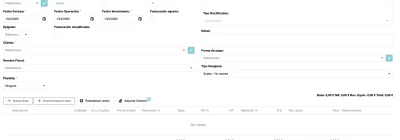New Immediate Supply of Information system (SII)
Patrick Gordinne Perez2024-02-07T06:33:38+00:00If your company declares VAT on a monthly basis, since July 2017 the new Immediate Supply of Information (SII) system has been applicable, which will oblige you to submit your invoice record books electronically.
New Immediate Information Supply System (SII)
If your company files its VAT returns on a monthly basis (this will be the case if you invoice more than 6,010,121.04 euros per year, or if you are registered in the Groups regime or in the REDEME), since July 2017 you must file your VAT returns electronically.
To do so, you must use a web service or an electronic form that the Tax Authorities have set up at their E-Office.
Immediate information
But the most innovative aspect is the immediacy of this SII system. So, for example:
- Data on invoices issued must be provided within four days of their issue, and always before the 16th day of the month following the month in which the sale was made.
- Data on invoices received must be communicated within four days of their posting and always before the 16th day of the month following the month in which the VAT settlement period in which they were included falls.
Both for invoices issued and invoices received, Saturdays, Sundays and national holidays are not counted when calculating the days.
SII penalties
If your company fails to comply with this new reporting obligation, the Tax Authorities may impose a penalty of 0.5% of the amount of undeclared invoices, with a quarterly minimum of 300 euros and a maximum of 6,000 euros.
Advantages of the new immediate information system SII
Advantages of the SII
In exchange for applying this regime, your company will obtain certain advantages:
- Since you will already be reporting all your operations, you will be exempted from filing the annual declaration of operations with third parties (form 347), the annual VAT summary (form 390) and form 340 (if your company is registered in the REDEME).
- Also, from July 2017, you will be able to file your VAT returns up to the 30th of each month (instead of the 20th, as is currently the case). In the case of returns for the months of January, until the last day of February (the 28th or 29th, depending on whether the year is a leap year or not).
Recommendation regarding the SII
To make it easier for you to provide the information, consider issuing all sales invoices and posting all purchase invoices with the date of specific days of each month (e.g. the 10th, 20th and last day of the month):
- In this way, within the first four days following these dates, your company will know that it must send the details of its invoices to the tax authorities (in this case, it will have to provide the information three times a month).
- If you record invoices received as you receive them or invoices issued as you carry out operations, you will have to provide the information more regularly and it will be more difficult to keep proper control, and you may incur penalties.
Comply with the SII's deadlines for submission
invoices issued and invoices received.
If your company submits its invoice register books through the Immediate Supply of Information (SII), remember that as of 2018 the deadline for sending the corresponding data is only four days (in 2017 it was eight days), excluding Saturdays, Sundays and national holidays. Note. Specifically:
- You must provide the data on invoices issued within four days of their issue, and always before the 16th of the month following the month in which the sale was made.
- With regard to invoices received, you must supply the data within four days of posting, and always before the 16th day of the month following that of the settlement period in which the transactions are to be included.
Investment goods in the SII
If your company is on a pro-rata basis,
you must also provide the data from the investment goods register (assets of more than 3,005.06 euros that are likely to be used for more than one year), in this case up to 30 January of the following year.
The information included in this book is additional to that of the book of invoices received, so that these acquisitions are registered in both books.
Intra-Community transactions in the SII
Finally, you must provide the data in the intra-Community operations book within four days from the start of the transport or, where applicable, from the time of receipt of the goods.
Make no mistake, the usual intra-Community deliveries and acquisitions must be recorded in the books of invoices issued and received. The transactions in the register of intra-Community transactions are only the following:
- The dispatch or receipt of goods for the performance of expert reports or work carried out on movable tangible property.
- The transfer of goods of the same company from one EU country to another.
SII penalties
Penalty for late submission to the SII
Well, make sure that you respect the deadlines for remission. Otherwise, the tax authorities may impose penalties under the following terms (which have been approved as of 2018):
- In general, the penalty is 0.5% of the amount of invoices reported late. This amount includes VAT, as well as any applicable equivalence surcharge and compensation under the Agriculture, Livestock and Fisheries Regime (REAGP).
- The minimum penalty is 300 euros and the maximum penalty is 6,000 euros per quarter. Both the minimum and the maximum must be determined taking into account all the infringements committed in each calendar quarter.
- In the case of the register of investment goods and intra-Community transactions, the penalty is 150 euros per register.
Failure to keep the registers
Given that some business owners see the SII as an excessive burden and that these penalties do not seem high (especially if the volume of transactions is high), they could consider not filing their books electronically and assume this cost.
Well, don’t gamble. These penalties are only applicable if you comply with the SII. If you do not, the penalties are higher: 1% of turnover, with a minimum of 600 euros and no upper limit.
If your company is late in providing data on invoices issued or received, the tax authorities may impose a penalty of 0.5% of the amount of these invoices, with a minimum of 300 euros and a maximum of 6,000 euros per quarter.
Check if you have to declare monthly
Are you a large company?
If your company files quarterly returns, check in January whether your turnover last year exceeded 6,010,121.04 euros.
Attention! If this is the case, you will become a large company. If so, from that moment onwards:
- You will have to submit your regular VAT and withholding tax returns on a monthly basis, not quarterly.
- When calculating payments on account of Corporate Income Tax, you will have to do so according to the base method.
- In addition, you must file your VAT registration books online through the Immediate Supply of Information (SII) system.
If you are a new large company, you must file a Census Declaration.
In these cases, during the month of January, file a census declaration and register your company in the Register of large companies.
In the same way, if in previous years your company was a large company, but last year your volume of operations was less than 6,010,121.04 euros, inform them that you have ceased to be one and that, from now on, you will file your returns on a quarterly basis.






